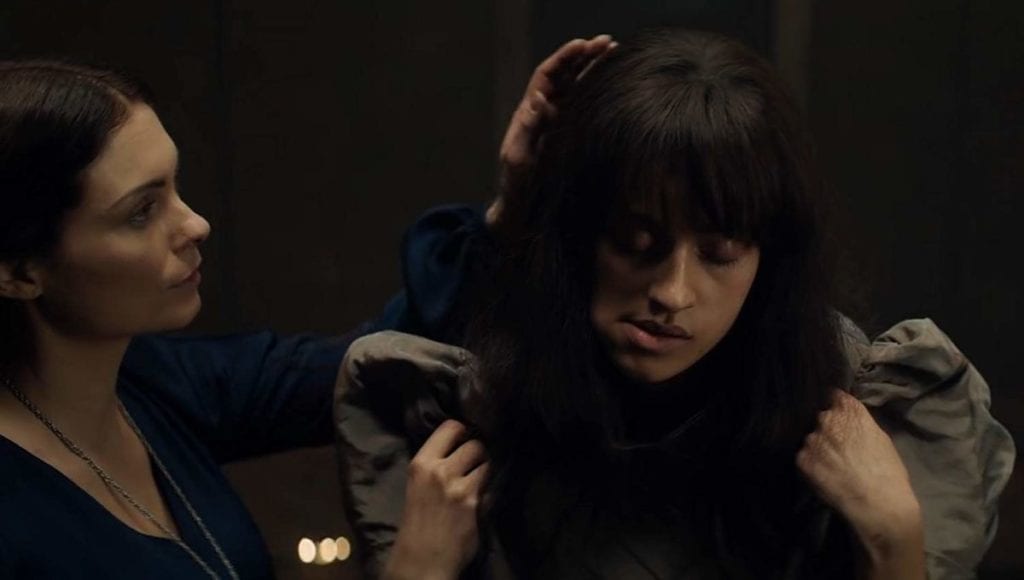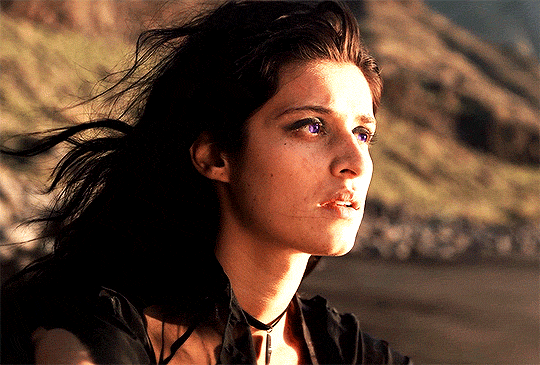Disclaimer: This article discusses only the plots and characters included in the Netflix adaptation of The Witcher, and has no relation to the books or video games in which it is based.
Contains spoilers. / TW: Mentions of suicide.
Locked away in my house in self-isolation is the perfect moment to obsessively analyze television. This time, I’m taking a look at Yennefer of Vengerbeg, one of my absolute favorite characters to come out of TV lately. Parycja would say that “I like my women… angry”.
The Witcher premiered on Netflix on December 2019 and was soon declared one of the platforms most popular original releases to date. Read Bo’s full review here.
The fantasy series mostly follows Geralt of Rivia (played by Henry Cavill), who is a witcher; a warrior magically modified to fight monsters. Along with Geralt, we also get the stories of princess Cirilla of Cintra and the sorceress Yennefer of Vengerberg.
She is introduced in the second episode of the series, and for most of her screen time, Yennefer is angry. She has two basic moods: seething and done with everything, with few moments of happiness or sadness layered in between. She isn’t portrayed as an easy person to get along with, and clashes with other characters such as Jaskier, the peppy bard who is Geralt’s best friend. In fact, she has fraught relationships with most of the people in her life including Geralt, her love interest.
Personally, I found Yennefer, played by Anya Chalotra, to be the most interesting character in the series. It took me three days to finish the pilot, and then I binged from the second episode onwards, captivated the moment Yennefer came on screen, with a flower and a smile.
She starts out as a sweet girl from a farm, then displays immense ambition to become the most powerful mage, go back home and show those who once laughed. This all proves disappointing. Turns out power, beauty and influence don’t make her feel whole or happy. Later, and for most of the season, Yennefer becomes obsessed with motherhood, which is by far the most criticized aspect of her character as far as I’ve seen, but one that I think has root in her anger.
But why is Yennefer so angry? I will try to dissect her reasons, and why I believe her fury and dissatisfaction are not only justified but also often righteous.
The Witcher is not a perfect show by any means. The timelines are wonky and hard to follow at times. Often it feels a bit too much like one game side quest after another. Even its portrayal of Yennefer has been criticized in regards to her disability and her desire for motherhood. This article does not mean to overlook these issues, but rather hyperfocus on a single aspect of Yennefer’s character which, in my opinion, is well-executed and particularly compelling.
Humble Beginnings
Yennefer is a farmer’s daughter who suffers from bullying and discrimination for her deformed spine and facial paralysis. She displays magical talent, which catches the attention of Tissaia de Vries (MyAnna Buring), the rectoress of Aretuza, a magic school. Her father doesn’t hesitate to sell her for less than the price of a pig, and so she is taken against her will.
The very first scene Yennefer is in, she offers a couple a flower they had dropped, with a big, hopeful smile on her face, like she’s looking to make a friend.
What she is met with is discrimination and violence. The couple pick on her for her physical appearance, and tackle her to the floor, hitting her with absolutely no provocation. In her distress, Yennefer accidentally creates a portal to Aretuza. Istredd, a mage played by Royce Pierreson, finds her and explains to her what she’s done. He realizes she’s never done anything like this before, and says “Oh, you’re a virgin”.
Yennefer slaps him across the face, but then immediately cowers and apologizes, in fear of his reaction. Istredd doesn’t react violently, though, and instead tries to help her escape Tissaia’s detection.
This sequence is key when trying to understand Yennefer’s character. With her humble beginnings and very visible disability, most people, including the average audience member, would imagine her to be innocent and submissive. There is pure innocence in the way Yennefer offers the flower back to the couple in the barn, yes. But she is quick to prove that the fire is there from the beginning as well. She doesn’t defend herself in the barn, instead, she takes out her pent up anger on Istredd. Yennefer’s submissiveness at first stems from being helpless. She isn’t too physically strong, she’s vulnerable, so she takes it. But from very early on, Yennefer understands she does not deserve it.

“You can’t take me, I won’t go”, she says to Tissaia after the deal to buy her is struck. Of course, she doesn’t have a choice. Once in Aretuza, another key moment in Yennefer’s story occurs. She tries to commit suicide by slitting her wrists. Tissaia saves her life. Again, no choice in the matter.
Tissaia: “Do you know how many people wouldn’t blink if you died?”
Yennefer: “You should have let me die. At least I had control over that.”
Tissaia: “That’s adorable, piglet. You weren’t taking control. You were losing it.”
Arguably, you can boil Yennefer’s entire arc after this–her choices, her dissatisfaction and all of her anger–down to these two key moments, and to one person: Tissaia de Vries.
Tissaia and Yennefer:
complicated feelings and motherhood

The most significant and complicated interaction Yennefer has is with Tissaia. She anchors her relationship with every other character, even Geralt. She cannot be at peace until she has made peace with her rectoress and mother figure.
Tissaia herself is a complicated beast. She buys Yennefer and immediately expects respect and reverence from her, failing to see how the whole buying thing might affect how the girl feels about her.
Nevertheless, Tissaia shows her more lenience and patience than all of her other students combined. It is clear she sees something special in Yennefer, yet insists on verbally berating and belittling her, and won’t hesitate to use her if need be. They develop a fraught mother-daughter dynamic… which is why I was baffled to find that people ship them, but I digress.
I’d argue ambition was always part of Yennefer’s core personality. However, what she craved most at first was love. And though Istredd provided part of that, it was parental love and approval that was severely lacking in her childhood, and only Tissaia could really give that to her. The way to obtain it was to become a powerful sorceress.
“Imagine the most powerful woman in the world. Her hair, the color of her eyes, yes. But also the strength of her posture. The poise of her entire being. Do you see her?” – Tissaia to Yennefer
So Yennefer becomes it. She subjects herself to the procedure that will make her beautiful in everyone’s eyes, but also removes her womb. She rejects Istredd, who loves her but doesn’t understand her ambition. She takes the position she believes is rightfully hers, defying Tissaia–to prove to her that she can.
She gets all of it, and in the end it is… disappointing. Empty.
Yennefer’s Womb
We find Yennefer again decades later, bored with court life. Power and influence of the kind Aretuza prepared her for yields only dissatisfaction, and she wants out. She traded everything for beauty and power. She found power empty and beauty overrated.
“I love that I traded everything to get my seat at court. I love that I believed that it would all be worth it, that this would be my legacy. The greatest mage to have ever graced a court. And I really, really love that instead I’ve gotten to spend the last three decades cleaning up stupid political messes. Glorified royal arse wiper.”
At this point, there is no going back to the farm, but she’ll be damned if she goes back to Aretuza and Tissaia. No, on the contrary, she sets out to try and recover what Aretuza took from her. That is at the core of her search for motherhood.
I do not for a second believe Yennefer’s desire for a child has to do with her wish to be a mother, a role she isn’t suited for at all.
Yennefer: “Do you think I would make a mad [mother]?”
Geralt: “Most definitely.”
She is not particularly nurturing, after all. Besides, if what she wanted was a child or to be a mother, period, she could just adopt a baby and call it a day. But that’s not the point, is it? The point is recovering what she gave up. She paid and as she sees it, never got her payment’s worth.
Another interpretation is that, given the prominence of magical destiny in the story, Yennefer’s search wasn’t for just any kid, but for Ciri specifically, which is interesting on a different level. But from a character standpoint, what Yennefer wants is her money back, because that was terrible service, sir, mister universe.
She wants vindication for the way the universe has wronged her. At this point, Yennefer probably thinks that recovering the choice to be a mother, and having a being that loves her, to whom she is the whole world, will fill the gaping hole in her chest. She is proved wrong when she meets Geralt.
Geralt and Yen
Characters repeatedly ask Geralt if it’s true witchers feel nothing. He is constantly disproving that, but never more strikingly than when he meets Yennefer.
My god, is Geralt smitten with her. From the moment he lays eyes on her, he’s a goner, even though she’s sketchy and cruel at first. However, it isn’t easy for them. Geralt runs away after their first encounter, fearful of just how much he feels. A hundred years of emotional repression will do that to a person.
Afterwards, it is Yen who runs away every time they meet. She is adamant on her mission to recover her womb and have a baby, something that Geralt, who is himself running away from the responsibility of his magical child of surprise, finds very hard to understand. Still, he loves her. Looking back through the magical destiny lens, you could say the reason Geralt and Yennefer couldn’t come together for so long is because Yen is desperately searching for Ciri (even though she may not know it), while Geralt is trying to avoid her. Until they align, they will keep missing each other.

Though the reason she walks away for good has squat to do with destiny. The first time they met, Geralt makes a wish with the power of a djinn to never lose Yennefer. She is furious when she finds out.
Yennefer: “That’s why we can’t escape each other. Why I feel this way inside. It’s not because of anything real or true. You made a wish. It’s magic.”
Geralt: “It’s real, Yen.”
Yennefer: “How could we ever know? Disregard for others’ freedom has become quite your trademark.”
The worst thing you could do to Yennefer is take away her choice.
Tissaia took away her choice to stay in Vengerberg and later to take her own life. The Chapter took away her choice of court. Aretuza took her choice to be a mother and she’s has spent years trying to get it back. It’s such a trauma to her that she doubts her own feelings for Geralt because of it.
And it also makes her furious, of course.
The Rightful Anger of the Sorceress
After breaking up with Geralt, Yen scrambles. She’s run out of things and people to direct her anger at. She’s lost purpose. She goes back to Istredd, and then back to Aretuza in search of something. That which has eluded her and she’s yet to be able to name.
It is difficult, because Yennefer is angry not on behalf of the powerful sorceress. No, she is angry on behalf of that girl at the barn, who just wanted to make a friend.
She knows that girl deserved better. Deep down, she knows she didn’t have to become beautiful and powerful or a mother to earn someone’s love.
So she is angry at her parents for denying such a basic thing. She’s furious at Tissaia and Aretuza for taking away her choices, and moreover, for promising that changing would earn it for her. She’s angry at Geralt, for smudging the love she feels for him, and even more for making her question the love he feels for her. She’s rightfully effing seething at the universe. A world that was cruel and rude to that girl in the barn for no food reason at all.
But perhaps most importantly–and complicated–she is angry at herself.
At the end of the day, Yennefer herself believed that she needed the beauty and the power. She was the one who decided to get rid of that girl. “Free the victim in the mirror,” as Tissaia put it.
Yennefer’s story in season one is a frantic search for something that will make her feel whole and at peace with who she is and the choices she herself made.
Yennefer: “Do you regret it? Becoming a Witcher?”
Geralt: “It’s hard to regret something you didn’t choose.”
Yennefer: “But if the choice had been yours… what would you have done instead?”
As far as choices go, many were taken away from her. But she did make one crucial decision: she was the one who chose to give up her womb to obtain that unnamable thing. Unlike Geralt, she did have a choice at the last minute. And she believes that she chose wrong.
The Sublimation of Yennefer
In the last couple of episodes, Yennefer goes on a different quest. Feeling adrift, she returns to Aretuza when asked because what else is there to do?
The fate of the Continent is at stake at the hands of conquerors, and only the mages can protect a key fortress. Reluctantly, Yennefer follows, questioning what she and they are doing at every turn. Skeptical, numb… perhaps too numb to even be angry anymore.
“Why would I protect this?”
This world that wronged her from the start.
In their time apart, Tissaia de Vries has been evolving. A proud, emotionally constipated woman herself, she doesn’t so much apologize, but she does show Yennefer the recognition and appreciation she often denied her.

Healing the wounds of our parents’ disapproval is never so easy as that, but it is a start for them to be able to recognize they care about each other.
Yennefer: “It’s time to accept that life has no more to give.”
Tissaia: “You still have so much left to give.”
You are a gift to the world, is what Tissaia tells her in a nutshell. And what do you know? Yennefer finds herself caring. Turns out she cares about her sisters and friends, cares about Tissaia and cares about the Continent itself.
Yennefer is still angry. Decades of anger aren’t healed overnight, but Nilfgaard, the kingdom conquering the Continent with blood and tyranny, turns out to be a perfect target for it. Inadvertently, it is in this righteous battle that Yennefer finds that nameless thing she’s been searching for all these years: she finds purpose.


